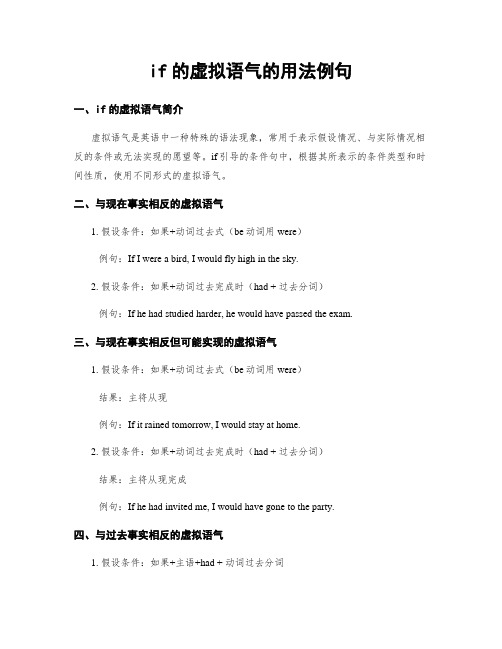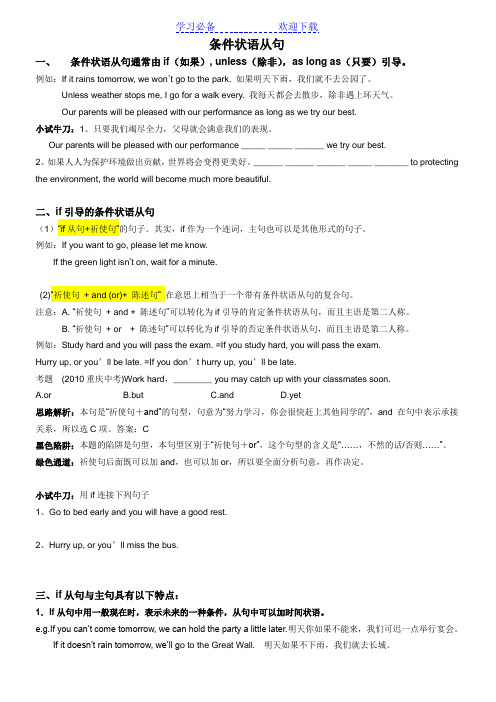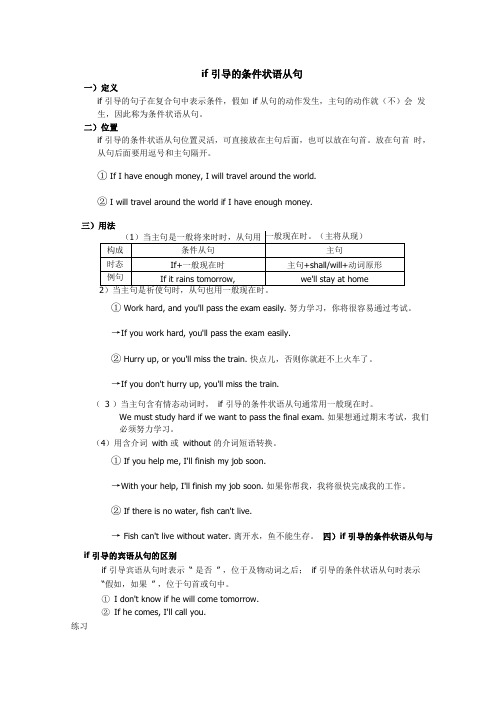If 用法汇总及练习
If用法汇总及练习

If 用法汇总1、主将从现(主句为一般将来时,从句为一般现在时);eg:If it rains(从句) ,I will stay at home(主句).=I will stay at home if it rains.2、主句含有情态动词(must、may、can etc.)从句为一般现在时;eg:If you drive too fast ,you may have an accident.=You may have an accident if you drive too fast3、主句为祈使句,从句要用一般现在时态;eg:Don't play computer games if you don't finish your homework. 4、是否=whetherAsk if he is at home. I wonder if she is ill.5、虚拟语气eg:If I were a bird ,I would fly in the sky.(事实我不可能是鸟)时态:可以表示过去,现在和将来的情况,它的基本特点是时态退后.a.同现在事实相反的假设从句用一般过去时should( would) +动词原形If they were here,they would help you.b.表示于过去事实相反的假设从句用过去完成时should(would) have+ 过去分词If she had worked harder,she would have succeeded.If my lawyer had been here last Saturday,he would have prevented me from going.c.表示对将来的假想一般过去时,were+ to do,从句:主+ should/would/could/might+v原形should+ v原形,If you succeeded,everything would be all right.If you were to succeed,everything would be all right.If you should succeed,everything would be all right.单项练习(每个必须让学生翻译)1. If I _____ where he lived, I _____ a note to him.A. know, would have sentB. had known, would have sentC. know, would sendD. knew, would have sent2.Mary is ill today. If she _____, she _____ absent from school.A. were not ill; wouldn’t beB. had been ill; wouldn’t have beenC. had been ill; should have beenD. hadn’t been ill; could be3. He acted as if he _____ everything in the world.A. knewB. knowsC. has knownD. won't know4. If you had enough money, what _____?A. will you buyB. would you buyC. would you have boughtD. will you have bought5. If Mr. Young _____ with justice, he _____ such a wrong thing.A. were treated; wouldn’t doB. had been treated; wouldn’t have doneC. were treated; wouldn’t have doneD. had been treated; wouldn’t do6. What _____ if there _____ no light during the day?A. will happen; wasB. would happen; isC. happens; wereD. would happen; were7. The spokesman acted that way as if he _____ anything about the accident but actually he did.A. doesn’t hearB. didn’t hearC. haven’t heardD. hadn’t heard8.If it _____ not for the fact that you _____ ill now, I would surely punish you.A. is; areB. were; wereC. were; areD. was; were9. Many Chinese movie stars now have given up their Chinese nationality. If I were them,I _____ that.A. shouldn’t doB. didn’t doC. hadn’t doneD. won’t do10. I want to get back by 5 o’clock if _____.A. likelyB. canC. possibleD. Probable11. It seems as if it _____ already summer now but it is only February.A. isB. wasC. wereD. had been12. If Henry had not pulled his cap low over his brow, he _____ by the police.A. might be recognizedB. might have been recognizedC. would have recognizedD. was to have been recognized13. There is a ring at the door. That _____ be the postman, I suppose.A. willB. wouldC. is going toD. was going to14. Look at the dark clouds—there _____ be a storm.A. willB. must have beenC. is going toD. would15. —Why are you taking the pictures down?—I _____ the wall.A. paintB. have just paintedC. am going to paintD. will have painted16. —Can I stay at home tomorrow?—Yes, you can if it_____.A. will snowB. is going to snowC. snowsD. snowed17. I don’t know if he _____ this afternoon. But if he _____, I will tell you.A. will come; will do;B. comes; will doC. will come; doesD. comes; does18. —I thought I asked you to fix the radio.—Oh, I’m sorry. I _____ it right away.A. am to doB. will doC. was about to doD. am going to do19. The WTO can’t live up to its name _____ it does not include a country that is home to one fifth of mankind.A. as long asB. whetherC. ifD. even though20. Ask him to ring me up if you _____ him.A. seeB. sawC. would seeD. will see21. It’s so late. I don’t think he ______ come.A. wouldB. shouldC. is going toD. shall22. If people _____ polluting the air, animals and plants will die soon.A. don’t stopB. didn’t stopC. shall not stopD. haven’t stopped23. If you _____ an interesting day out, ______ the Science Museum.A. want; visitingB. want; visitC. want to; visitD. wanting; visit24. If the pure water is heated to 100 centigrade degrees, it ______ boil.A. is going toB. willC. wouldD. is to25. Is a dictionary available, _____ so, where?A. ifB. if isC. and ifD. and if is1—5 BAABB 6—10 DDCAC11—15 CBACC 16—20 CCBCA 21—25 CABBC最后一练——1.If you _____ to the party, you’ll have a great time. A. will go B. went C. go D. going2. It will be a long time ____ Peter _____ his work.A. since, has finishedB. after, finishesC. when, will finishD. before, finishes.3. What will father _____ us from Japan? A. take B. bring C. carry D. make4. Weifang is famous ______ kites. A. for B. to C. on D. with5.I ____ her the answer if she ____me.A. can tell, will askB. will tell, will askC. would tell, askD. will tell, asks6. – What are you going to do tomorrow?--We’ll go to the library tomorrow if it ___.A. isn’t rainB. rainC. won’t rainD. doesn’t rain7.—Do you know when he will come back tomorrow?--Sorry, I don’t know. When he ____ back, I’ll tell you.A. comesB. will comeC. comeD. may come8. What will you do if you _____ to the old folk’s home visit?A. goB. wentC.goingD. will go9. If I eat ____ food, I’ll be very fat.A. too manyB. many tooC. too muchD. much too10. I’ll give the book to him if he ___ here next Sunday.A. will comeB. comesC. is comingD. came11. There ____an English film in our school tomorrow.A. is going to haveB. will haveC. is going to beD. has12. Could you tell us where ____?A. will the next Olympic Games heldB. the next Olympic Games will be heldC. would the next Olympic Games be heldD. the next Olympic Games would be held13. When my mother returned last night, I ____ a book.A. readB. am readingC. was readingD. am going to read14.What ____ you ____ when it began to rain?A. do, doB. were, doingC. are, doingD. did, do15. I’ll wake you up when he ____back.A. willB. is going to comeC. comesD. come1---5 CDBAD 6---10 DAACB 11---15 CBCBC。
if句型的用法总结

if句型的用法总结1. if句型的基本用法if句型是英语中最常用的条件句句型之一,它用于描述一个条件成立时会发生什么样的结果。
基本的if句型结构为:if 条件:条件成立时执行的代码块在这个结构中,条件决定了是否执行代码块的部分。
如果条件成立,代码块将会被执行;如果条件不成立,则代码块将会被忽略。
2. if…else句型除了基本的if句型外,还有一个常见的变体——if…else句型。
它在条件成立时执行一个代码块,并在条件不成立时执行另一个代码块。
其结构如下:if 条件:条件成立时执行的代码块else:条件不成立时执行的代码块在if…else句型中,如果条件成立,将执行if代码块;否则,将执行else代码块。
3. if…elif…else句型在某些情况下,我们可能需要判断多个条件,并根据不同的条件执行不同的代码块。
这时,可以使用if…elif…else句型。
其结构如下:if 条件1:条件1成立时执行的代码块elif 条件2:条件2成立时执行的代码块elif 条件3:条件3成立时执行的代码块...else:条件都不成立时执行的代码块在if…elif…else句型中,只有当前面的条件不成立时才会判断后面的条件。
如果某个条件成立,将执行对应的代码块。
如果所有条件都不成立,将执行else代码块。
4. 嵌套if语句在某些情况下,我们可能需要在if代码块中再次使用if语句,这就是嵌套if语句。
嵌套if语句可以用于处理更复杂的条件判断。
例如:if 条件1:if 条件2:条件1和条件2同时成立时执行的代码块else:条件1成立,但条件2不成立时执行的代码块else:条件1不成立时执行的代码块在嵌套if语句中,内部的if语句只有在外部if语句的条件成立时才会被执行。
5. if语句的注意事项•条件表达式:–条件表达式应该是一个布尔表达式,即可以判断为真或假的表达式。
–可以使用比较运算符(如==、!=、<、>等)、逻辑运算符(如and、or等)以及其他返回布尔值的函数或表达式作为条件。
if的虚拟语气的用法例句

if的虚拟语气的用法例句一、if的虚拟语气简介虚拟语气是英语中一种特殊的语法现象,常用于表示假设情况、与实际情况相反的条件或无法实现的愿望等。
if引导的条件句中,根据其所表示的条件类型和时间性质,使用不同形式的虚拟语气。
二、与现在事实相反的虚拟语气1. 假设条件:如果+动词过去式(be动词用were)例句:If I were a bird, I would fly high in the sky.2. 假设条件:如果+动词过去完成时(had + 过去分词)例句:If he had studied harder, he would have passed the exam.三、与现在事实相反但可能实现的虚拟语气1. 假设条件:如果+动词过去式(be动词用were)结果:主将从现例句:If it rained tomorrow, I would stay at home.2. 假设条件:如果+动词过去完成时(had + 过去分词)结果:主将从现完成例句:If he had invited me, I would have gone to the party.四、与过去事实相反的虚拟语气1. 假设条件:如果+主语+had + 动词过去分词结果:主语+would/could/might + have + 过去分词例句:If I had known the truth, I would have made a different decision.2. 假设条件:如果+主语+had not +过去分词形式,结果也用一般过去时态例句:If we hadn't missed the train, we would have arrived on time.五、与将来事实相反的虚拟语气1. 假设条件:如果+动词过去式(be动词用were)结果:主将从现(应该+动词原形)例句:If they were here, they would help us.2. 假设条件:如果+should/were to/might/could/would + 动词原形结果:主将从现(应该+动词原形)例句:If he should call, please ask him to wait.六、虚拟语气中常用的连词和引导短语1. if: 引导条件状语从句,表示假设情况。
if条件句练习题及答案

if条件句练习题及答案一、选择题1. 如果明天不下雨,我们将去野餐。
A) If it doesn't rain tomorrow, we will go for a picnic.B) If it rains tomorrow, we will go for a picnic.C) If it will rain tomorrow, we will go for a picnic.D) If it rains tomorrow, we will not go for a picnic.2. 只有当我完成作业后,我才会看电视。
A) I will watch TV only after I finish my homework.B) I will watch TV only before I finish my homework.C) I will watch TV only while I finish my homework.D) I will not watch TV only after I finish my homework.3. 除非他道歉,否则我不会原谅他。
A) I will forgive him unless he apologizes.B) I will not forgive him unless he apologizes.C) I will forgive him if he does not apologize.D) I will not forgive him if he apologizes.4. 只要我们努力工作,我们就能成功。
A) We can succeed as long as we work hard.B) We can succeed unless we work hard.C) We can succeed if we do not work hard.D) We cannot succeed unless we work hard.5. 如果你饿了,冰箱里有食物。
if条件句练习题及答案

if条件句练习题及答案If条件句练习题及答案If条件句是英语语法中非常重要的一部分,它用来表达假设或条件。
以下是一些if条件句的练习题及答案,希望能帮助大家更好地掌握这一语法知识。
练习题一:用正确的if条件句填空。
1. If I __________ (have) enough money, I would buy a new car.2. If it __________ (rain) tomorrow, we will stay at home.3. If she __________ (study) harder, she would pass the exam.4. If he __________ (not be) late, we would have caught the train.答案:1. had2. rains3. studied4. had not been练习题二:选择正确的if条件句。
1. If I had studied harder, I __________ the exam.a) would have passedb) will passc) passd) passed2. If it rains tomorrow, we __________ our picnic.a) will cancelb) would cancelc) canceld) cancelled3. If you had told me earlier, I __________ helped you.a) willb) wouldc) would haved) had答案:1. a) would have passed2. a) will cancel3. c) would have练习题三:根据给定的情景写出合适的if条件句。
1. 你的朋友迟到了,你会怎么说?If you had left home earlier, you wouldn't have missed the bus.2. 你想和朋友一起去看电影,但天气可能会下雨,你会怎么说? If it rains tomorrow, we will stay at home and watch a movie.3. 你没有通过考试,你会怎么安慰自己?If I had studied harder, I would have passed the exam.答案:1. If you had left home earlier, you wouldn't have missed the bus.2. If it rains tomorrow, we will stay at home and watch a movie.3. If I had studied harder, I would have passed the exam.希望以上练习题和答案能帮助大家更好地理解和掌握if条件句的用法。
if引导的条件状语从句讲解和练习(答案)

条件状语从句一、条件状语从句通常由if(如果), unless(除非),as long as(只要)引导。
例如:If it rains tomorrow, we won’t go to the park. 如果明天下雨,我们就不去公园了。
Unless weather stops me, I go for a walk every. 我每天都会去散步,除非遇上坏天气。
Our parents will be pleased with our performance as long as we try our best.小试牛刀:1、只要我们竭尽全力,父母就会满意我们的表现。
Our parents will be pleased with our performance _____ _____ ______ we try our best.2、如果人人为保护环境做出贡献,世界将会变得更美好。
______ ______ ______ _____ _______ to protecting the environment, the world will become much more beautiful.二、if引导的条件状语从句(1)“if从句+祈使句”的句子。
其实,if作为一个连词,主句也可以是其他形式的句子。
例如:If you want to go, please let me know.If the green light isn’t on, wait for a minute.(2)“祈使句+ and (or)+ 陈述句” 在意思上相当于一个带有条件状语从句的复合句。
注意:A. “祈使句+ and + 陈述句”可以转化为if引导的肯定条件状语从句,而且主语是第二人称。
B. “祈使句+ or + 陈述句”可以转化为if引导的否定条件状语从句,而且主语是第二人称。
例如:Study hard and you will pass the exam. =If you study hard, you will pass the exam.Hurry up, or you’ll be late. =If you don’t hurry up, you’ll be late.考题(2010重庆中考)Work hard,________ you may catch up with your classmates soon.A.orB.butC.andD.yet思路解析:本句是“祈使句+and”的句型,句意为“努力学习,你会很快赶上其他同学的”,and在句中表示承接关系,所以选C项。
干货:if的11种用法(中考、高考)

干货:if的11种用法(中考、高考)if的12种用法(中考、高考以及稍高些的…)1.主将从现的if:表示经常发生或总是如此——这是目前中考英语常考的条目此种情况下的if后接的从句使用一般现在时或现在完成时,主句可以使用表示将来时的will, shall, can, must等情态动词,也可使用祈使句,be to do等结构。
1)We’ll go if the weather stays fine, but if it rains we’ll stay at home.2)I’ll go there, if I can find time.3)If anyone calls, tell them I’m not at home.4)If I don’t run, the train will have left. 如果我不跑,火车就会开走了。
5)If I’m going to a club, I wear much the same as I w ear for work.去俱乐部的话,我得和上班穿得差不多。
6) Should anyone call (= if anyone calls), please tell them I’m busy. (本条目以前发过)如果有人打电话来,请告诉他我正忙着。
If I stay till May, I’ll have been working here for 20 years.如果我待到5月,我在这儿工作就满20年了。
2.客观事实的if:总会这样,一般规则,客观真理,此时的if相当于when, whenever, every time,表示时间的含义。
(中高考英语不作为考查条目,需要平时了解)Accidents will happen. 意外总是难免的。
If metals gets hot it expands. 金属受热就膨胀。
Plastic will melt if it gets too hot. 塑料太热会融化。
if引导的条件状语从句知识点及练习题

if引导的条件状语从句一)定义if 引导的句子在复合句中表示条件,假如if 从句的动作发生,主句的动作就(不)会发生,因此称为条件状语从句。
二)位置if 引导的条件状语从句位置灵活,可直接放在主句后面,也可以放在句首。
放在句首时,从句后面要用逗号和主句隔开。
① If I have enough money, I will travel around the world.② I will travel around the world if I have enough money.① Work hard, and you'll pass the exam easily. 努力学习,你将很容易通过考试。
→If you work hard, you'll pass the exam easily.② Hurry up, or you'll miss the train. 快点儿,否则你就赶不上火车了。
→If you don't hurry up, you'll miss the train.( 3 )当主句含有情态动词时,if 引导的条件状语从句通常用一般现在时。
We must study hard if we want to pass the final exam. 如果想通过期末考试,我们必须努力学习。
(4)用含介词with 或without 的介词短语转换。
① If you help me, I'll finish my job soon.→With your help, I'll finish my job soon. 如果你帮我,我将很快完成我的工作。
② If there is no water, fish can't live.→ Fish can't live without water. 离开水,鱼不能生存。
四)if引导的条件状语从句与if引导的宾语从句的区别if 引导宾语从句时表示“ 是否” ,位于及物动词之后;if 引导的条件状语从句时表示“假如,如果” ,位于句首或句中。
- 1、下载文档前请自行甄别文档内容的完整性,平台不提供额外的编辑、内容补充、找答案等附加服务。
- 2、"仅部分预览"的文档,不可在线预览部分如存在完整性等问题,可反馈申请退款(可完整预览的文档不适用该条件!)。
- 3、如文档侵犯您的权益,请联系客服反馈,我们会尽快为您处理(人工客服工作时间:9:00-18:30)。
If 用法汇总1、主将从现(主句为一般将来时,从句为一般现在时);eg:If it rains(从句) ,I will stay at home(主句).=I will stay at home if it rains.2、主句含有情态动词(must、may、can etc.)从句为一般现在时;eg:If you drive too fast ,you may have an accident.=You may have an accident if you drive too fast3、主句为祈使句,从句要用一般现在时态;eg:Don't play computer games if you don't finish your homework. 4、是否=whetherAsk if he is at home. I wonder if she is ill.5、虚拟语气eg:If I were a bird ,I would fly in the sky.(事实我不可能是鸟)时态:可以表示过去,现在和将来的情况,它的基本特点是时态退后.a.同现在事实相反的假设从句用一般过去时should( would) +动词原形If they were here,they would help you.b.表示于过去事实相反的假设从句用过去完成时should(would) have+ 过去分词If she had worked harder,she would have succeeded.If my lawyer had been here last Saturday,he would have prevented me from going.c.表示对将来的假想一般过去时,were+ to do,从句:主+ should/would/could/might+v原形should+ v原形,If you succeeded,everything would be all right.If you were to succeed,everything would be all right.If you should succeed,everything would be all right.单项练习(每个必须让学生翻译)1. If I _____ where he lived, I _____ a note to him.A. know, would have sentB. had known, would have sentC. know, would sendD. knew, would have sent2.Mary is ill today. If she _____, she _____ absent from school.A. were not ill; wouldn’t beB. had been ill; wouldn’t have beenC. had been ill; should have beenD. hadn’t been ill; could be3. He acted as if he _____ everything in the world.A. knewB. knowsC. has knownD. won't know4. If you had enough money, what _____?A. will you buyB. would you buyC. would you have boughtD. will you have bought5. If Mr. Young _____ with justice, he _____ such a wrong thing.A. were treated; wouldn’t doB. had been treated; wouldn’t have doneC. were treated; wouldn’t have doneD. had been treated; wouldn’t do6. What _____ if there _____ no light during the day?A. will happen; wasB. would happen; isC. happens; wereD. would happen; were7. The spokesman acted that way as if he _____ anything about the accident but actually he did.A. doesn’t hearB. didn’t hearC. haven’t heardD. hadn’t heard8.If it _____ not for the fact that you _____ ill now, I would surely punish you.A. is; areB. were; wereC. were; areD. was; were9. Many Chinese movie stars now have given up their Chinese nationality. If I were them,I _____ that.A. shouldn’t doB. didn’t doC. hadn’t doneD. won’t do10. I want to get back by 5 o’clock if _____.A. likelyB. canC. possibleD. Probable11. It seems as if it _____ already summer now but it is only February.A. isB. wasC. wereD. had been12. If Henry had not pulled his cap low over his brow, he _____ by the police.A. might be recognizedB. might have been recognizedC. would have recognizedD. was to have been recognized13. There is a ring at the door. That _____ be the postman, I suppose.A. willB. wouldC. is going toD. was going to14. Look at the dark clouds—there _____ be a storm.A. willB. must have beenC. is going toD. would15. —Why are you taking the pictures down?—I _____ the wall.A. paintB. have just paintedC. am going to paintD. will have painted16. —Can I stay at home tomorrow?—Yes, you can if it_____.A. will snowB. is going to snowC. snowsD. snowed17. I don’t know if he _____ this afternoon. But if he _____, I will tell you.A. will come; will do;B. comes; will doC. will come; doesD. comes; does18. —I thought I asked you to fix the radio.—Oh, I’m sorry. I _____ it right away.A. am to doB. will doC. was about to doD. am going to do19. The WTO can’t live up to its name _____ it does not include a country that is home to one fifth of mankind.A. as long asB. whetherC. ifD. even though20. Ask him to ring me up if you _____ him.A. seeB. sawC. would seeD. will see21. It’s so late. I don’t think he ______ come.A. wouldB. shouldC. is going toD. shall22. If people _____ polluting the air, animals and plants will die soon.A. don’t stopB. didn’t stopC. shall not stopD. haven’t stopped23. If you _____ an interesting day out, ______ the Science Museum.A. want; visitingB. want; visitC. want to; visitD. wanting; visit24. If the pure water is heated to 100 centigrade degrees, it ______ boil.A. is going toB. willC. wouldD. is to25. Is a dictionary available, _____ so, where?A. ifB. if isC. and ifD. and if is1—5 BAABB 6—10 DDCAC11—15 CBACC 16—20 CCBCA 21—25 CABBC最后一练——1.If you _____ to the party, you’ll have a great time. A. will go B. went C. go D. going2. It will be a long time ____ Peter _____ his work.A. since, has finishedB. after, finishesC. when, will finishD. before, finishes.3. What will father _____ us from Japan? A. take B. bring C. carry D. make4. Weifang is famous ______ kites. A. for B. to C. on D. with5.I ____ her the answer if she ____me.A. can tell, will askB. will tell, will askC. would tell, askD. will tell, asks6. – What are you going to do tomorrow?--We’ll go to the library tomorrow if it ___.A. isn’t rainB. rainC. won’t rainD. doesn’t rain7.—Do you know when he will come back tomorrow?--Sorry, I don’t know. When he ____ back, I’ll tell you.A. comesB. will comeC. comeD. may come8. What will you do if you _____ to the old folk’s home visit?A. goB. wentC.goingD. will go9. If I eat ____ food, I’ll be very fat.A. too manyB. many tooC. too muchD. much too10. I’ll give the book to him if he ___ here next Sunday.A. will comeB. comesC. is comingD. came11. There ____an English film in our school tomorrow.A. is going to haveB. will haveC. is going to beD. has12. Could you tell us where ____?A. will the next Olympic Games heldB. the next Olympic Games will be heldC. would the next Olympic Games be heldD. the next Olympic Games would be held13. When my mother returned last night, I ____ a book.A. readB. am readingC. was readingD. am going to read14.What ____ you ____ when it began to rain?A. do, doB. were, doingC. are, doingD. did, do15. I’ll wake you up when he ____back.A. willB. is going to comeC. comesD. come1---5 CDBAD 6---10 DAACB 11---15 CBCBC。
